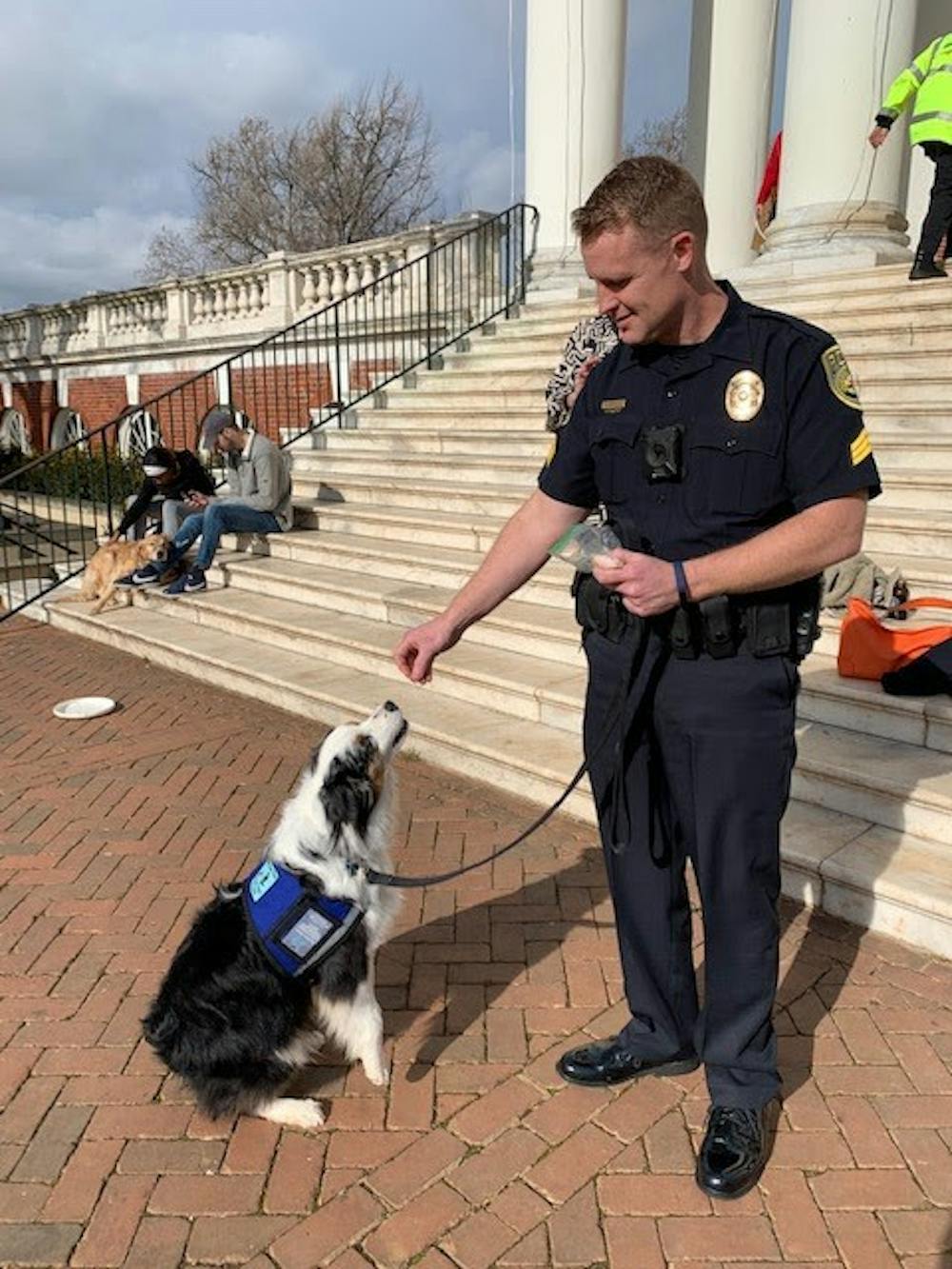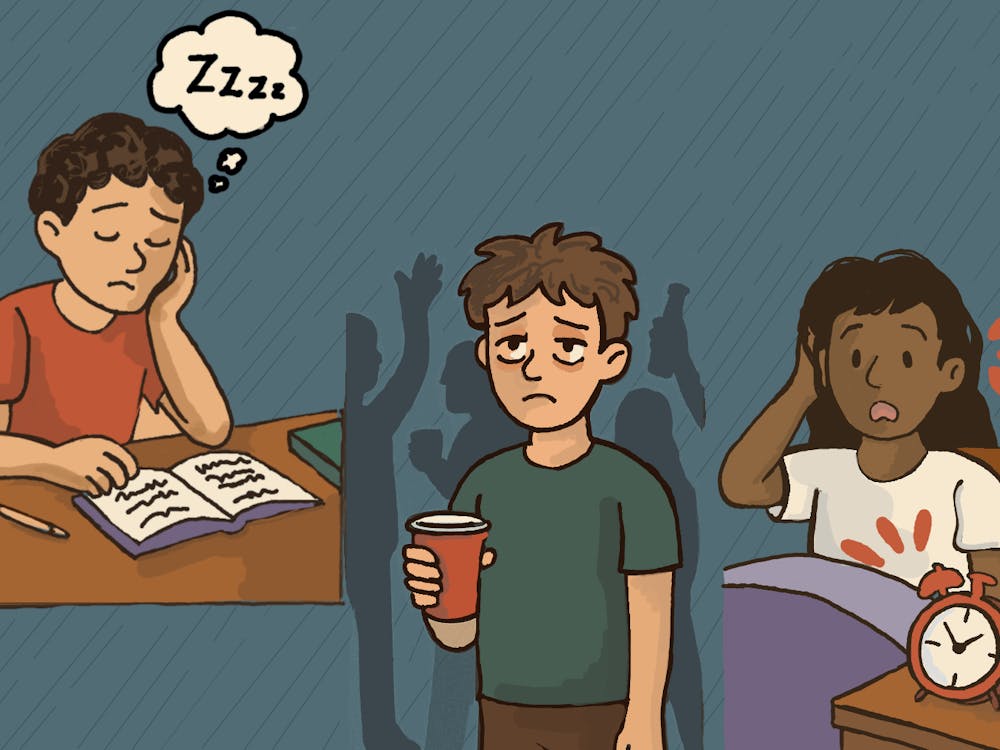A new member has recently joined the University Police Department, and he isn’t just any employee. Cooper, a miniature American shepherd, is now working alongside his handler and owner Sergeant Benjamin Rexrode at UPD.
As a trained therapy dog, Cooper offers a calming and stress-relieving presence for both police officers and members of the University community.
Rexrode specializes in crime prevention and community service where he works closely with crime victims, gives talks to first-year students in dorms and leads informative safety presentations for University students and faculty members. With the new addition of Cooper, Rexrode hopes to break down some of the barriers between University students and the police department.
“When people talk about police-community engagement everybody thinks … we need to create programs, but sometimes it’s just having a one-minute conversation to break that ice,” Rexrode said. “Cooper can serve as an ice breaker.”
For a lot of people, the chance to pet and play with a dog for a few minutes can brighten their day. Additionally, Rexrode explains that the simple act of taking Cooper out for a walk on Grounds can attract attention from students and create an environment that promotes community engagement, as dogs have the ability to open up a room and create excitement amongst a group of individuals.
Rexrode plans to bring Cooper when working with crime victims or students that have experienced serious trauma, so he can serve a stress-reliever or relaxer Oftentimes people are apprehensive about filing a report or are hesitant to open up, yet Cooper is able to create a more comfortable environment for these victims. Whether it be showing up for court or meeting with an investigator, he will be right there every step of the way to provide support.
Assoc. Dean of Students Laurie Casteen had the opportunity to meet Cooper at a recent safety presentation for University staff in Madison Hall. Together, Casteen and Rexrode led the presentation while Cooper tagged along to personally greet all attendees.
“The police and Sgt. Rexrode specifically are focused on engaging with the students, so they feel comfortable with the police, get to know them and see them as a resource,” Casteen said. “An adorable dog will be a huge draw to bring students in and is a great way to start a conversation.”
Rexrode mentioned that he cannot take credit for this idea, given that other police departments and universities have done similar things in the past, but he believes Cooper has a laid-back and calming disposition that sets him apart from most police dogs. While the UPD has two focused and high-energy German shepherds that are trained in explosive detection, Cooper seems to possess very few qualities of the typical police dog.
“He is kind of short, hairy and fat, so it is funny to see a police dog with opposite traits of a typical police dog,” Rexrode said.
The idea for a police therapy dog first came to Rexrode’s mind one day while speaking with his wife, Emily Rexrode. As a school counselor at Stuart’s Draft Elementary School, Emily Rexrode often talked about finding a certified therapy dog that could benefit her students and even encouraged her own kids to participate in volunteer therapy activities. This was when her husband quickly realized that a therapy dog would be beneficial in his line of work as well.
After speaking with the University about his idea and receiving approval, Rexrode began his search. Through a friend, he was put in contact with Bill and Dawn Knapp, who own Knapp Tyme Minis, a business that breeds dogs, in Michigan. The couple had been looking to rehome one of the dogs that they had originally intended to be a show dog, but that had grown too fast and exceeded American Kennel Club standards.
Originally, the dog’s name was Trooper — a name that Rexrode recalls finding too cliche, as the dog would be working alongside a University police officer. Given that Trooper was six months old and already responding to that name, he decided to change it to the similar-sounding Cooper. Now, as an 18-month American shepherd, Cooper seems to be responding well to that slight adjustment.
Instead of having Cooper flown in to Charlottesville, Rexrode decided to embark on the long journey to pick him up in Michigan last January. Rexrode braved snow storms in both Pennsylvania and Ohio to reach his frigid destination.
When Cooper first arrived in Charlottesville, he spent most of his days at Rexrode’s home, getting acclimated to the new environment. Around May, Cooper was enrolled in a training program at Positive Paws and received his certification to become a therapy dog in November.
Since then, he has been joining Rexrode at the police department almost every day. In fact, Rexrode remarked that Cooper has now become a department mascot, though rather unintentionally.
“If there is a day I don’t bring him, people are like, ‘Where is Cooper?’” Rexrode said. “ [He’s] been a de-stressor even here … I hadn’t intended on that, but it is a cool side thing that has happened.”
Rexrode plans to bring Cooper along wherever he goes, so Cooper can engage with students and become a friendly face in the police department.
Casteen agrees that Cooper imbues a spirit of happiness that will be contagious for both students and officers alike.
“Recognizing that there is literally a warm and fuzzy presence in the police department is really going to add a lot,” Casteen said.







